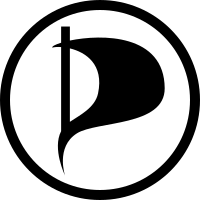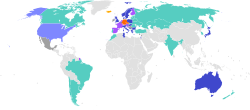Pirate Party
Pirate Party is a label adopted by political parties in different countries. Pirate parties support civil rights, direct democracy (including e-democracy) or alternative participation in government, reform of copyright and patent law, free sharing of knowledge (open content), information privacy, transparency, freedom of information, free speech, anti-corruption and net neutrality.[1]
Pirate Party | |
|---|---|
 | |
| Ideology | Pirate politics |
| Part of a series on |
| Pirate Parties |
|---|
 |
|
History
The first Pirate Party to be established was the Pirate Party of Sweden (Swedish: Piratpartiet), whose website was launched on 1 January 2006 by Rick Falkvinge. Falkvinge was inspired to found the party after he found that Swedish politicians were generally unresponsive to Sweden's debate over changes to copyright law in 2005.[2]
The United States Pirate Party was founded on 6 June 2006 by University of Georgia graduate student Brent Allison. The party's concerns were abolishing the Digital Millennium Copyright Act, reducing the length of copyrights from 95 years after publication or 70 years after the author's death to 14 years, and the expiry of patents that do not result in significant progress after four years, as opposed to 20 years. However, Allison stepped down as leader three days after founding the party.[3]
The Pirate Party of Austria (German: Piratenpartei Österreichs) was founded in July 2006 in the run-up to the 2006 Austrian legislative election by Florian Hufsky and Jürgen "Juxi" Leitner.[4]
The Pirate Party of Finland was founded in 2008 and entered the official registry of Finnish political parties in 2009.
The Pirate Party of the Czech Republic (Czech: Česká pirátská strana) was founded on 19 April 2009 by Jiří Kadeřávek.
The 2009 European Parliament election took place between the 4 and 7 June 2009, and various Pirate Parties stood candidates. The most success was had in Sweden, where the Pirate Party of Sweden won 7.1% of the vote, and had Christian Engström elected as the first ever Pirate Party Member of European Parliament (MEP).[5][6] Following the introduction of the Treaty of Lisbon, the Pirate Party of Sweden were afforded another MEP in 2011, that being Amelia Andersdotter.
On 30 July 2009, the Pirate Party UK was registered with the Electoral Commission. Its first party leader was Andrew Robinson, and its treasurer was Eric Priezkalns.[7][8][9]
In April 2010, an international organisation to encourage cooperation and unity between Pirate Parties, Pirate Parties International, was founded in Belgium.[10]

In the 2011 Berlin state election to the Abgeordnetenhaus of Berlin, the Pirate Party of Berlin (a state chapter of Pirate Party Germany) won 8.9% of the vote, which corresponded to winning 15 seats.[11][12] John Naughton, writing for The Guardian, argued that the Pirate Party of Berlin's success could not be replicated by the Pirate Party UK, as the UK does not use a proportional representation electoral system.[13]
In the 2013 Icelandic parliamentary election, the Icelandic Pirate Party won 5.1% of the vote, returning three Pirate Party Members of Parliament. Those were Birgitta Jónsdóttir for the Southwest Constituency, Helgi Hrafn Gunnarsson for Reykjavik Constituency North and Jón Þór Ólafsson for Reykjavik Constituency South.[14][15] Birgitta had previously been an MP for the Citizens' Movement (from 2009 to 2013), representing Reykjavik Constituency South. As of 2015, it was the largest political party in Iceland, with 23.9% of the vote.[16]
The 2014 European Parliament election took place between the 22 and 24 May. Julia Reda was at the top of the list for Pirate Party Germany, and was subsequently elected as the party received 1.45% of the vote. Other notable results include the Czech Pirate Party, who received 4.78% of the vote, meaning they were 0.22% off getting elected, the Pirate Party of Luxembourg, who received 4.23% of the vote, and the Pirate Party of Sweden, who received 2.19% of the vote, but lost both their MEPs.[17]
Reda had previously worked as an assistant in the office of former Pirate Party MEP Amelia Andersdotter.[18] On 11 June 2014, Reda was elected Vice-President of the Greens/EFA group in the European Parliament.[19] Reda was given the job of copyright reform rapporteur.[20]
The Icelandic Pirate Party was leading the national polls in March 2015, with 23.9%. The Independence Party polled 23.4%, only 0.5% behind the Pirate Party. According to the poll, the Pirate Party would win 16 seats in the Althing.[21][22]
In April 2016, in the wake of the Panama Papers scandal, polls showed the Icelandic Pirate Party at 43% and the Independence Party at 21.6%,[23] although the Pirate Party eventually won 15% of the vote in the 29 October 2016 parliamentary election.
In April 2017, a group of students at University of California, Berkeley formed a Pirate Party to participate in the Associated Students of the University of California senate elections, winning the only third-party seat.[24]
Czech Pirate Party entered the Chamber of Deputies of the Czech Parliament for the first time after the election held on 20 and 21 October 2017 with 10.79%.
Czech Pirate Party, after finishing at the second place at the 2018 Prague municipal election, held on 5 and 6 October 2018, with 17.1%, formed a coalition with Prague Together and United Forces for Prague (TOP 09, Mayors and Independents, KDU-ČSL, Liberal-Environmental Party and SNK European Democrats). The representative of the Czech Pirate Party, Zdeněk Hřib, was selected as a Mayor of Prague. It is probably for the first time, when any pirate party has a mayor in one of the major cities of the world.
After the 2019 European Parliament election, three newly elected Czech Pirate MEPs and one German Pirate MEP were admitted to the Greens–European Free Alliance, the aforementioned group in the European Parliament that has previously included Swedish Pirate MEPs.
Common policies
While parties vary insofar as specific policies go, common themes of the Pirate movement include:
- Defend the freedom of expression, communication, education; respect the privacy of citizens and civil rights in general.
- Defend the free flow of ideas, knowledge and culture.
- Support politically the reform of copyright and patent laws.
- Have a commitment to work collaboratively, and participate with maximum transparency.
- Do not support actions that involve violence.
- Use free software and open source software, open-source hardware, DIY and open protocols whenever possible.
- Politically defend an open, participative and collaborative construction of any public policy.
- Direct democracy/E-democracy (with the exception of Pirate Party of Greece, which rejected the principle into the 2013 congress)
- Open access
- Open data
- Crowdfunding and crowdsourcing
Copyright and censorship
Some campaigns have included demands for the reform of copyright and patent laws.[25] In 2010, Swedish MEP Christian Engström called for supporters of amendments to the Data Retention Directive to withdraw their signatures, citing a misleading campaign.[26]
International organizations

Pirate Parties International
Pirate Parties International (PPI) is the umbrella organization of the national Pirate Parties. Since 2006, the organization has existed as a loose union[27] of the national parties. Since October 2009, Pirate Parties International has had the status of a non-governmental organization (Feitelijke vereniging) based in Belgium. The organization was officially founded at a conference from 16 to 18 April 2010 in Brussels, when the organization's statutes were adopted by the 22 national pirate parties represented at the event.[28]
European Pirate Party
The European Pirate Party (PPEU) is a European political party founded in March 2014 which consists of various pirate parties within European countries.[29]
Pirates without Borders
Pirates Without Borders is an international association of pirates. Unlike Pirate Parties International (which accepts only parties as voting members and organizations as observing members), Pirates Without Borders accept individuals as members. The PWB see themselves as a basis for international projects. Through global cooperation, they strive to reveal the impact of multinational trade agreements on all people on Earth, and foster freedom and democracy.[30] PWB originates from an independent committee for the coordination of Pirate parties in German-speaking countries, known as DACHLuke (DACHL = Germany-Austria-Switzerland-Luxembourg).
Since the Pirate Parties International Conference 2011 on 12 and 13 March 2011, PWB is an "observing member" of Pirate Parties International. The previously independent project "pirate streaming" has become a part of Pirates without Borders since 3 May 2011.
Parti Pirate Francophone
In Parti Pirate Francophone, the French-speaking Pirate Parties are organized. Current members are the pirates parties in Belgium, Côte d'Ivoire, France, Canada, and Switzerland.
European Parliament elections
2014
| State | Date | % | Seats |
|---|---|---|---|
| United Kingdom1 | 22 May 2014 | 0.49 | 0 |
| Netherlands | 22 May 2014 | 0.85 | 0 |
| Austria2 | 25 May 2014 | 2.1 | 0 |
| Croatia | 25 May 2014 | 0.39 | 0 |
| Czech Republic | 25 May 2014 | 4.78 | 0 |
| Finland | 25 May 2014 | 0.7 | 0 |
| France | 25 May 2014 | 0.32 | 0 |
| Germany | 25 May 2014 | 1.45 | 1 |
| Greece3 | 25 May 2014 | 0.90 | 0 |
| Estonia4 | 25 May 2014 | 1.8 | 0 |
| Luxembourg | 25 May 2014 | 4.23 | 0 |
| Poland | 25 May 2014 | 0.02 | 0 |
| Slovenia | 25 May 2014 | 2.58 | 0 |
| Spain | 25 May 2014 | 0.24 | 0 |
| Sweden | 25 May 2014 | 2.23 | 0 |
1Party only participated in North West England constituency
2PPAT is in alliance with two other parties: The Austrian Communist Party and Der Wandel. The alliance is called "Europa Anders" and also includes some independents in their lists
3with Ecological Greens
4PPEE are campaigning for an independent candidate (Silver Meikar) who supports the pirate program
2019
| State | Date | % | Seats |
|---|---|---|---|
| Czech Republic | 24 May 2019 | 13.95 | 3 |
| Finland | 26 May 2019 | 0.7 | 0 |
| France | 26 May 2019 | 0.14 | 0 |
| Germany | 26 May 2019 | 0.7 | 1 |
| Italy | 26 May 2019 | 0.2 | 0 |
| Luxembourg | 26 May 2019 | 7.7 | 0 |
| Spain | 26 May 2019 | 0.07 | 0 |
| Sweden | 26 May 2019 | 0.6 | 0 |
National elections
| Country | Date | % | Seats |
|---|---|---|---|
| Sweden | 17 September 2006 | 0.63 | 0 |
| Germany | 27 September 2009 | 1.95 | 0 |
| Sweden | 19 September 2010 | 0.65 | 0 |
| United Kingdom | 6 May 2010 | 0.35 | 0 |
| Netherlands | 9 June 2010 | 0.11 | 0 |
| Finland | 17 April 2011 | 0.51 | 0 |
| Canada | 2 May 2011 | 0.02 | 0 |
| Switzerland | 23 October 2011 | 0.48 | 0 |
| Spain | 20 November 2011 | 0.14 | 0 |
| Greece | 6 May 2012 | 0.51 | 0 |
| Greece | 17 June 2012 | 0.23 | 0 |
| Netherlands | 15 March 2017 | 0.34 | 0 |
| Israel | 22 January 2013 | 0.05 | 0 |
| Iceland | 27 April 2013 | 5.10 | 3/63 |
| Iceland | 29 October 2016 | 14.48 | 10/63 |
| Australia | 7 September 2013 | 0.31 | 0 |
| Australia | 2 July 2016 | <0.01 | 0 |
| Australia | 18 May 2019 | TBA | 0 |
| Norway | 8–9 September 2013 | 0.34 | 0 |
| Germany | 22 September 2013 | 2.19 | 0 |
| Austria | 29 September 2013 | 0.77 | 0 |
| Luxembourg | 20 October 2013 | 2.94 | 0 |
| Slovenia | 13 July 2014 | 1.34 | 0 |
| Sweden | 14 September 2014 | 0.43 | 0 |
| Israel | 17 March 2015 | 0.02 | 0 |
| Finland | 19 April 2015 | 0.85 | 0 |
| United Kingdom | 6 May 2015 | <0.01 | 0 |
| Germany | 24 September 2017 | 0.40 | 0 |
| Czech Republic | 20–21 October 2017 | 10.78 | 22/200 |
| Iceland | 28 October 2017 | 9.20 | 6/63 |
| Slovenia | 3 June 2018 | 2.15 | 0 |
| Sweden | 9 September 2018 | 0.11 | 0 |
| Luxembourg | 14 October 2018 | 6.45 | 2/60 |
| Israel | 9 April 2019 | 0.02 | 0 |
| Finland | 14 April 2019 | 0.62 | 0 |
| Belgium | 26 May 2019 | 0.11 | 0 |
Elected representatives
Representatives of the Pirate Party movement that have been elected to a national or supranational legislature.
Pirate Party of Sweden
- Christian Engström, MEP for Sweden from 2009 to 2014
- Amelia Andersdotter, MEP for Sweden from 2011 to 2014
Chamber of Deputies of the Czech Republic (in office)
- Jakub Michálek, MP for Prague since 2017
- Dana Balcarová, MP for Prague since 2017
- Ondřej Profant, MP for Prague since 2017
- Olga Richterová, MP for Prague since 2017
- Jan Lipavský, MP for Prague since 2017
- Ivan Bartoš, MP for Central Bohemia since 2017, Leader of the Czech Pirate Party
- Lenka Kozlová, MP for Central Bohemia since 2017
- František Kopřiva, MP for Central Bohemia since 2017
- Lukáš Kolařík, MP for South Bohemia since 2017
- Lukáš Bartoň, MP for Plzeň since 2017
- Petr Třešnák, MP for Karlovy Vary since 2017
- František Navrkal, MP for Ústí nad Labem since 2019[31]
- Tomáš Martínek, MP for Liberec since 2017
- Martin Jiránek, MP for Hradec Králové since 2017
- Mikuláš Ferjenčík, MP for Pardubice since 2017
- Jan Pošvář, MP for Vysočina since 2017
- Radek Holomčík, MP for South Moravia[32][32][32] since 2017
- Tomáš Vymazal, MP for South Moravia[33][33][33] since 2017
- Vojtěch Pikal, MP for Olomouc since 2017
- František Elfmark, MP for Zlín since 2017
- Lukáš Černohorský, MP for Moravian-Silesian since 2017
- Ondřej Polanský, MP for Moravian-Silesian since 2017
Senate of the Czech Republic (in office)
- Lukáš Wagenknecht, Senator for Prague 8 since 2018
European Parliament
- Marcel Kolaja, MEP for Czech Republic since 2019
- Markéta Gregorová, MEP for Czech Republic since 2019
- Mikuláš Peksa, MEP for Czech Republic since 2019
Former representatives
- Libor Michálek, Senator for Prague 2 from 2012 to 2018
- Mikuláš Peksa, MP for Ústí nad Labem from 2017 to 2019[34]
Pirate Party Germany
- Patrick Breyer, MEP for Germany since 2019
Former representatives
- Julia Reda, MEP for Germany from 2014 to 2019
Pirate Party Iceland
- Jón Þór Ólafsson, MP for Reykjavik Constituency South from 2013 to 2015 and for Southswest Constituency since 2016
- Helgi Hrafn Gunnarsson, MP for Reykjavik Constituency North from 2013 to 2016 and again since 2017
- Björn Leví Gunnarsson, MP for Reykjavík Constituency North from 2016 to 2017 and for Reykjavík Constituency South since 2017
- Halldóra Mogensen, MP for Reykjavík Constituency North since 2016
- Smári McCarthy, MP for Southwest Constituency since 2016
- Þórhildur Sunna Ævarsdóttir, MP for Southwest Constituency from 2016 to 2017 and for Reykjavík Constituency South since 2017
Former representatives (Iceland)
- Birgitta Jónsdóttir, MP for Reykjavik Constituency South from 2009 to 2013, and for Southwest Constituency from 2013 to 2017
- Ásta Guðrún Helgadóttir, MP for Reykjavík Constituency South from 2015 to 2017
- Einar Brynjólfsson, MP for Northeast Constituency from 2016 to 2017
- Eva Pandóra Baldursdóttir, MP for Northwest Constituency from 2016 to 2017
- Gunnar Hrafn Jónsson, MP for Reykjavík Constituency South from 2016 to 2017
Pirate Party Luxembourg
- Sven Clement, MP for Centre
- Marc Goergen, MP for Sud
National parties
Outside Sweden, pirate parties have been started in over 40 countries,[35] inspired by the Swedish initiative.
See also

- Criticism of copyright
- Internet freedom
- Right to privacy
References
- "About the PPI".
- Anderson, Nate (26 February 2009). "Political pirates: A history of Sweden's Piratpartiet". Ars Technica. Retrieved 7 August 2015.
- Downie, James (24 January 2011). "What is the Pirate Party—and why is it helping Wikileaks?". New Republic. Retrieved 7 August 2015.
- Igler, Nadja (19 September 2006). "Österreichs Piraten sehen grün". Future Zone (in German). Retrieved 7 August 2015.
- "European elections 2009: Sweden's Pirate Party wins a seat in parliament". The Telegraph. 8 June 2009. Retrieved 7 August 2015.
- Edwards, Chris (11 June 2009). "Sweden's Pirate party sails to success in European elections". The Guardian. Retrieved 7 August 2015.
- Harris, Mark (11 August 2009). "Pirate Party UK sets sail". techradar. Retrieved 8 August 2015.
- "Pirate Party launches UK poll bid". BBC News. 13 August 2009. Retrieved 8 August 2015.
- Barnett, Emma (11 August 2009). "Pirate Party UK now registered by the Electoral Commission". The Telegraph. Retrieved 8 August 2015.
- "Pirate Parties: From digital rights to political power". BBC News. 18 October 2011. Retrieved 8 August 2015.
- Dowling, Siobhan (18 September 2011). "Pirate party snatches seats in Berlin state election". The Guardian. Retrieved 7 August 2015.
- Kulish, Nicholas (19 September 2011). "Pirates' Strong Showing in Berlin Elections Surprises Even Them". New York Times. Retrieved 7 August 2015.
- Naughton, John (20 September 2011). "Could the Pirate party's German success be repeated in Britain?". The Guardian. Retrieved 7 August 2015.
- "Iceland vote: Centre-right opposition wins election". BBC News. 28 April 2013. Retrieved 8 August 2015.
- Penny, Laurie (8 May 2013). "Laurie Penny on Iceland's elections: A shattered fairy tale". New Statesman. Retrieved 8 August 2015.
- Edick, Cole (2015). "The Golden Age of Piracy". Harvard International Review. 36 (4): 7–9 – via Ebscohost.
- Collentine, Josef Ohlsson (26 May 2014). "All Pirate Party votes in the EU election". Pirate Times. Retrieved 8 August 2015.
- Nordenfur, Anton (6 January 2014). "Julia Reda tops German list to European Parliament". Pirate Times. Retrieved 8 August 2015.
- Reda, Julia. "Election as Vice-President of the Greens/EFA Group". Julia Reda. Retrieved 8 August 2015.
- Steadman, Ian (29 January 2015). "The Pirate Party's lone MEP might just fix copyright across the EU". New Statesman. Retrieved 8 August 2015.
- Hudson, Alex (19 March 2015). "The Pirates becomes the most popular political party in Iceland". Mirror. Retrieved 7 August 2015.
- "The Pirate Party is now measured as the biggest political party in Iceland". Vísir. 19 March 2015. Retrieved 7 August 2015.
- Björnsson, Anna Margrét (6 April 2016). "Almost half of Icelandic nation now want the Pirate Party". Iceland Monitor. Retrieved 6 April 2016.
- Andrea Platten | Senior Staff (14 April 2017). "Executive seats split between CalSERVE, Student Action in 2017 ASUC elections". The Daily Californian. Retrieved 12 May 2017.
- Copley, Caroline (20 September 2009). "Germany's 'Pirate Party' hopes for election surprise". Reuters blog. Reuters. Retrieved 5 March 2014.
- Engström, Christian (2 June 2010). "Urging MEPs to withdraw their Written Declaration 29 signatures". Christian Engström blog. WordPress.com. Retrieved 5 March 2014.
- Pirate Parties International Archived 21 May 2012 at the Wayback Machine in the wiki of Pirate Parties International, retrieved 21 January 2011
- "22 Pirate Parties from all over the world officially founded the Pirate Parties International". Pirate Parties International. 21 April 2010. Archived from the original on 4 March 2012. Retrieved 5 April 2012.
- "Here comes the European Pirate Party". PirateTimes.
- "Pirates without Borders Wiki". Pirates without Borders. Archived from the original on 27 April 2012. Retrieved 5 April 2012.
- "Bc. Frantisek Navrkal". public.psp.cz.
- "Mgr. Radek Holomcik". public.psp.cz.
- "Tomas Vymazal". public.psp.cz.
- "Pirát Peksa zvolený do europarlamentu se vzdal mandátu v české sněmovně. Nahradí ho analytik Navrkal". iROZHLAS.
- "Piratenpartij presenteert verkiezingsprogramma" (in Dutch). 3VOOR12 NL. 20 May 2010. Retrieved 9 April 2011.
External links
| Wikimedia Commons has media related to Pirate parties. |
- Pirate Parties International – official website